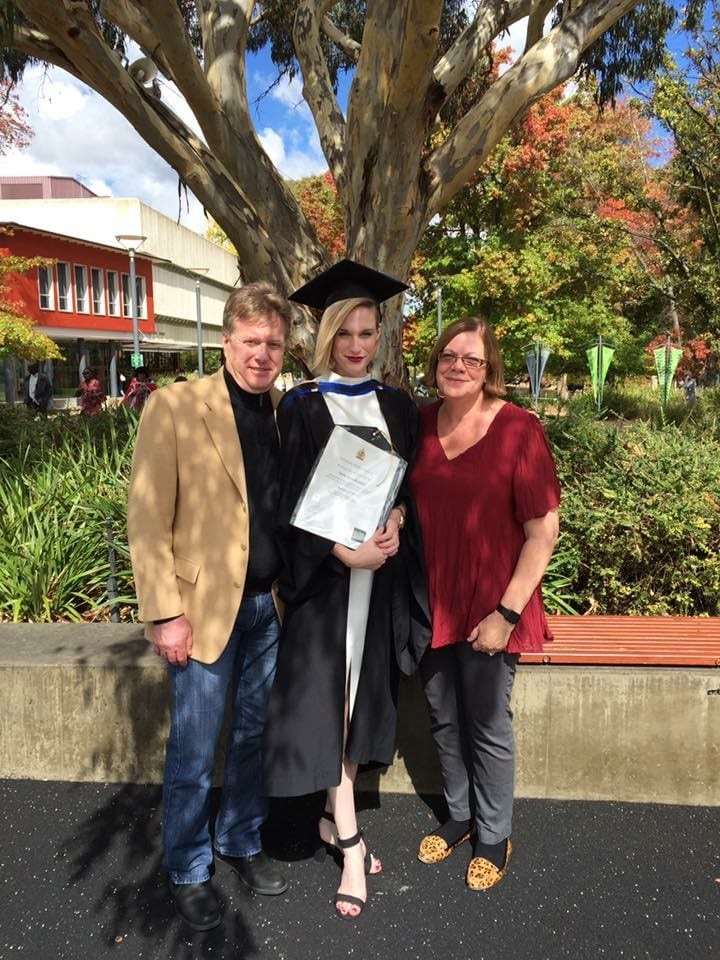Written by Julia Werren
Tasha emigrated with her family from Alberta in Canada. After completing a Pathways Course at the University of Newcastle, Tasha decided to enrol in a Bachelor of Laws at the University of New England. Like many UNE School of Law students, Tasha started studying on-campus when she first started her law degree. She lived at Mary White College which was only a short distance from her lecture theatres.
The aspect she liked most about studying at the UNE School of Law was the accessibility of the staff. Tasha found this didn’t change when she later became an online student. The lecturers were always only an email or a phone call away! Her favourite subject at the UNE School of Law, much to my amusement, was Torts 1. She hoped to practice in personal injury law, but life took her in another direction. Now her favourite area of law is insolvency law- how did I go so wrong????
Tasha is now working as a solicitor at Craddock Murray Neumann Lawyers in Sydney. She predominantly does work with the Australian Tax Office (ATO) as well as wind ups and bankruptcy matters. In addition she does debt recovery work in Workers Compensation cases.
When Tasha told me this, I commented ‘this must be very difficult and emotive work.’ She is pragmatic about her work and is able to separate her emotions from legal matters. She also made the very valid point that this work needs to be undertaken for the greater good. You see, if people receive money they are not entitled to, these funds should be recovered for the good of others.
As the School of Law turns 25 this year, I asked Tasha what she thinks legal practice will look like in 25 years’ time. She noted ‘one of the main changes is that many law firms are starting to go paperless. This is a reaction to firms becoming both more environmentally and economically conscious. The way billing is done is also changing.’ Tasha noted ‘billing is changing to a lump sum payment rather than hourly billing. This is often more attractive to clients as they then have a greater understanding of their financial liability for the outset.’ Tasha also fails to believe that the legal profession will get to a point where it is fully automated. This is certainly the case in insolvency law where Tasha is in court at least twice a week.
Tasha also commented on the changes which have recently been made to bankruptcy law. If someone is now declared bankrupt, this will only be in effect for a period of one year instead of three years. This may make a significant difference to whether or not someone is willing to declare bankruptcy. Tasha noted ‘a lot of people don’t seriously consider what it means to become bankrupt- at times credit agencies spruik it as a way out without highlighting the implications.’
Tradition is important to Tasha. She grew up under the positive influence of her parents Brenda and Keith. They taught her ‘if you are going to do something, you should always do it properly.’ Her mum Brenda is a Senior Lecturer in Education at UNE and her dad Keith has just completed a PhD at the UNE Business School- clearly they took their own advice!
Tasha and her partner Elise got married in New Zealand in November last year. Once the amendment to the Marriage Act went through in Australia, their marriage was immediately recognised as being valid in Australia. Tasha recounted how difficult and frustrating it was to be constantly subjected to the debate that was underway relating to same-sex marriage. Day after day this issue was discussed and analysed by the media. When the ‘yes’ vote finally came to fruition, Tasha shed a tear of joy!
Tasha and Elise are currently mid-way through their first pregnancy. For obvious reasons, Tasha and her wife needed help to achieve their pregnancy. Tasha is carrying the baby which was created using Elise’s egg and a sperm donor. Interestingly, Tasha and her partner decided to find a sperm donor in the United States. They chose to do this for a variety of practical reasons. The information which is available in the US about a sperm donor is a lot more extensive than is allowed in Australia.
Tasha and Elise were able to receive baby to adult photos of the sperm donor. They were also able to listen to recordings of the donor talking about important topics as well as a full medical history. In comparison, the information that can be disclosed in Australia is much more limited. This was important to Tasha and Elise as heterosexual couple’s get to choose who they have babies with, so why shouldn’t they? Anyone who has studied LAW 342 (Medico-Legal Issues) will note this scenario has very interesting parentage implications.
In terms of what stands out as the best times of her life, Tasha cited both her wedding day and the day she was admitted as a solicitor. She chose when she was admitted as a solicitor over her UNE graduation as ‘the certificate was much nicer from the College of Law.’ I suspect Tasha will have a new favourite day when her little boy is born early next year!
Thank you for sharing your story with us Tasha!





